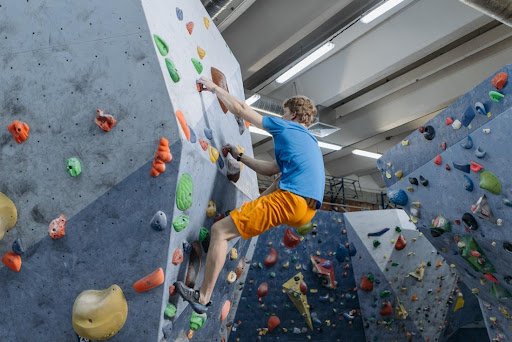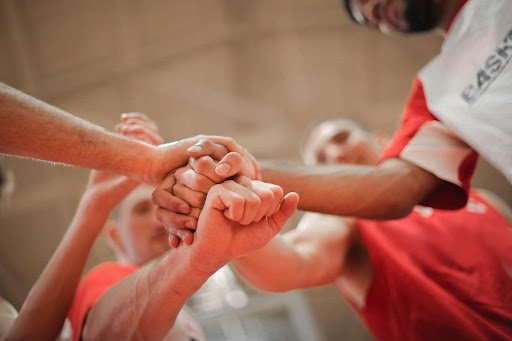Let me off at the Top (of the rock climbing wall that teaches life skills)
By Caleb Chapman
While working at Educational Talent Search (ETS) I mentored students from surrounding high schools. I was able to relate to a lot of the kids because many came from smaller schools like the one I went to. They all knew of my school and many had been there for sports or events. The first event I did with ETS was when I went rock climbing at Myers Field House with seventh and eighth graders. These were all kids who come from a background where neither parent has a college degree. It was my job to mentor them on information about college but through this experience, I learned a lot about myself and how our beliefs can affect our performance.
I started out talking about what the kids’ expectations for college were and what their expectations were for rock climbing. I asked one young man if he was scared and he said no way because he climbed trees all the time. That sounded like something I would say. I asked a young woman whether she was excited because she seemed a little tense and she told me she was really nervous and didn’t know if she was going to do it. I encouraged her and told her that once you try it and get going you’ll probably love it. She wasn’t entirely convinced. Once we got to the wall and they met the instructors everyone loosened up. The instructors walked them through the safety measures and how everything worked while helping them put the gear on.
When climbing began most of them were a bit timid towards the wall. I tried to help by discussing strategy but to some degree, a tall adult will have a different strategy than a 14-year-old. I noticed that the boy who I’d talked to earlier was already climbing up the wall quickly. He would then strategize with the other boys who were excited about different ways to challenge each other. The girl who was uncertain earlier was much more engaged once I started discussing strategy with her. As soon as it became a team situation and her performance was being watched she was able to perform better. This is referred to in Psychology as Social Facilitation. Social Facilitation is the idea that we perform better when we are experienced at completing a task and someone is watching but we perform worse when we are inexperienced or bad at the task and people are watching (Hetherington et al., 2006). Within 20 minutes she was continuously climbing and stopping saying she didn’t think she could go any further and then going a step further. I think that she and the young man were better able to access social facilitation due to being extraverted. Grayson and Murphy (Graydon & Murphy, 1995) found a highly significant interaction between those who are extroverted and the presence of an audience. It was fascinating to see her self-image progress every time she overcame an obstacle that she had perceived as impossible and to see this psychological concept at work.
These two different scenarios show two different routes. Both got to the destination around the same time. Both had different attitudes that led them on different but not better routes. The girl who didn’t know if she could do it likely gained a lot of self-confidence in her ability to do things that seem hard until they’re done. The boy realized that even though he was naturally good at climbing the real fun came when it became a social activity where people were working together towards a common goal. Both students achieved a skill that will benefit them a great deal in college. Both also developed important life skills and even inspired me to get on the wall myself. 18 months after hip surgery I was still not at 100% and had struggled to get back to the gym due to a fear of doing more damage. I tried to rock climb with great care at the beginning but I soon realized that I had more strength and balance than I had realized. Watching kids strategize with each other and overcome obstacles right in front of my eyes inspired me to give myself that chance at a monumental moment in my physical health. I accomplished it and felt like a kid climbing grandma’s birch trees again. I can hear her yelling to get down now.
One of the most valuable takeaways I have from this experience is the extent to which our behaviors are altered positively and negatively by personal belief, social support, and the willingness to fail. To foster better relationships with those I help succeed I plan to encourage positive experiences in all three. I was also able to witness the experience of Social Facilitation firsthand. Social Facilitation is the idea that we perform better when we are experienced at completing a task and someone is watching but we perform worse when we are inexperienced or bad at the task and people are watching (Hetherington et al., 2006). Climbing is something I’ve done a lot as a kid and am naturally good at. When I knew there were a bunch of kids watching and hoping I would do well I could tell that my focus went deeper and my body seemed to follow. Apparently, rock climbing is a lot more than just the physical experience I had expected. I’m glad I was wrong.
Reference
Hetherington, M. M., Anderson, A. S., Norton, G. N., & Newson, L. (2006). Situational effects on meal intake: A comparison of eating alone and eating with others. Physiology and Behavior, 88(4-5), 498–505. https://doi.org/10.1016/j.physbeh.2006.04.025
Graydon, J., & Murphy, T. (1995). The effect of personality on social facilitation whilst performing a sports related task. Personality and Individual Differences, 19(2), 265–267. https://doi.org/10.1016/0191-8869(95)00052-8

